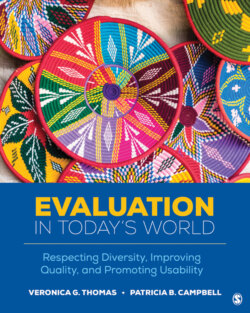Читать книгу Evaluation in Today’s World - Veronica G. Thomas - Страница 104
На сайте Литреса книга снята с продажи.
Summary
ОглавлениеA critical task for evaluators in any evaluation is to identify issues, including those of an ethical nature, that might hamper the conduct of a fair, honest, and accurate evaluation. This chapter examined evaluation ethics and the quality standards that are expected to govern the behavior of evaluators and the outcomes of an evaluation. Evaluators must take necessary steps to equip themselves with the knowledge, skills, and dispositions to accomplish this goal. This means having the sensitivity to identify and deal with the ethical challenges in the evaluation context. This chapter highlighted some common ethical challenges and offered possible solutions. Special consideration was given to how conflicts of interest, cultural issues, racial bias, and political issues impact evaluation ethics. The origin of research ethics, why they are important, and the three ethical principles from the Belmont Report were discussed to provide readers with a foundation for better understanding current evaluation ethics. The AEA’s Evaluators’ Ethical Guiding Principles and the Joint Committee on Standards for Educational Evaluation’s Program Evaluation Standards, although unable to cover every possible scenario that an evaluator might face, were discussed to provide a framework that gives guidance to evaluators.
In conclusion, the following is a set of reflective questions, adapted from Patton (2003, pp. 408–409), that evaluators can ask themselves to help them think through some ethical issues that might arise during their work.
How will the evaluation contribute to society, the community, and/or the world?
Why should individuals participate in your project? What are the benefits to them?
How will you explain the purpose of the inquiry and methods to be used in ways that are accurate and understandable to those you are researching?
In what ways, if any, will conducting this research or program evaluation put people at risk? (Consider psychological, legal, and political issues and the possibility of people becoming ostracized by others.)
If you uncover controversial information, how should it be shared?
What are reasonable promises of confidentiality that can be fully honored?
What information can you not promise to keep confidential?
What kind of informed consent, if any, is necessary for mutual protection?
Who will have access to the data, and why?
How will you and your respondent(s) likely be affected by conducting this research or program evaluation?
Who will be the researcher or evaluator’s go-to person(s) during the study regarding ethical issues that might arise?
How hard will you press participants for data? Where will you draw the line?
What ethical framework and philosophy informs your work and ensures respect and sensitivity for those you study, beyond whatever may be required by law?
In the final analysis, evaluators must use their own moral compass, in conjunction with the guidance of the profession’s principles and standards, to take the most ethical and socially just course of action possible.
